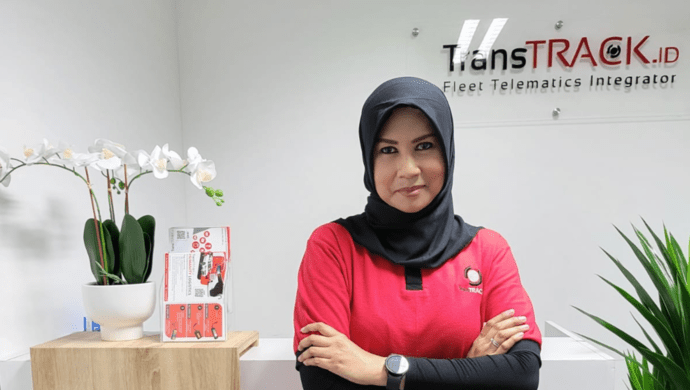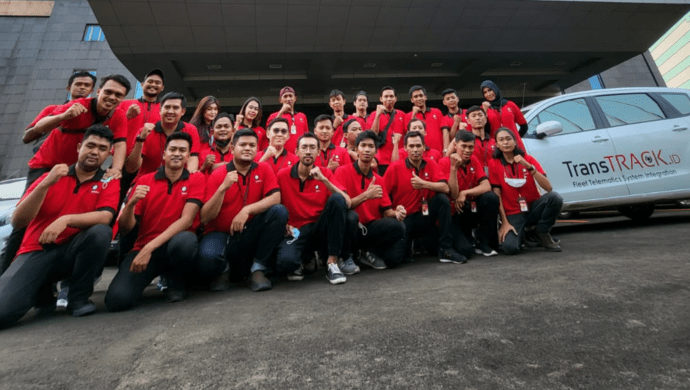
Anggia Meisesari, co-founder and CEO of TransTRACK.ID
In Indonesia’s male-dominated logistics-tech industry, a woman Muslim entrepreneur is making waves. Anggia Meisesari, a wife and mother, is the co-founder of TransTRACK.ID, a next-generation fleet management startup, recently bagged ~ US$550,000 in a seed financing round led by Cocoon Capital. The Indonesian Women Empowerment Fund (IWEF) also joined the round.
TransTRACK.ID, co-founded in 2019 by Meisesari (CEO) and Aris Pujud Kurniawan (CTO), has already secured partnerships with hundreds of fleet operators across 77 cities in the archipelago.
But running a business and achieving milestones has never been a cakewalk, according to her. But she has so far been successful in managing her personal and entrepreneurial life. “Finding a work-life balance is the key,” she says.
In this interview, Meisesari speaks about TransTRACK.ID, the challenges she faced, and how she has found a good work-life balance.
Edited excerpts:
Excerpts:
In the past, you worked in the IT, automotive and GPS industries for over ten years. When did the entrepreneurship bug bite you?
I gained substantial expertise in IT, vehicle telematics and IoT working over the last 20 years. Before founding TransTRACK.ID, I was the Indonesia country manager and sales director for a reputable fleet telematics company.
Based on my previous work experience, I found that of the 62 million commercial vehicles in Indonesia, only two per cent are connected to a fleet management system (FMS). Without an FMS, fleet managers have limited oversight of their fleet that adds to a range of issues, including higher maintenance and fuel costs, poor service delivery, theft, misuse of vehicles and frequent accidents.
Also Read: Indonesian logistics tech startup Waresix adds US$11M more to its war chest
Together with my co-founder Kurniawan, we built TransTRACK.ID, an all-in-one fleet telematics solution to help the logistics industry optimise fleet operations. Our ultimate mission is to make Indonesia’s roads safer and more efficient.
Indonesia is already home to several logistics-tech players. How does TransTRACK.ID stand out from its competitors?
There are 154 million vehicles on the roads in Indonesia facing problems, such as late deliveries, aggressive driving behaviour, rising fuel costs, etc. Only a small per cent of them have integrated telematics into their system, and almost 80-90 per cent don’t have one.
While there are several players out there, the market is so vast that there is still a significant market opportunity to tap. We focus on land transportation because the Indonesian logistics market is expected to reach US$303 billion by 2024.
What makes us stand out is that we’re not focused on selling devices. We have built an integrated, all-in-one solution based on a fleet management system. One USP of TransTRACK.ID’s platform is that it is compatible with more than 1,000 types of GPS devices available in the market, and it is easy to integrate. Vehicle operators can connect the device with our platform. They only pay a fee for the platform.
TransTRACK.ID is also the first fleet telematics provider in Indonesia that offers accident compensation via our platform. This means if a vehicle with our device installed with its system meets with an accident, the driver and passenger will get compensation for death or permanent disability or will be provided with other medical expenses.
How many paid users do you have?
We have more than 3,000 paid subscribers and are growing over 30 per cent month on month. This growth has been possible only because our customers have seen a 10-20 per cent increase in their productivity and utilisation and a 15-30 per cent reduction in overtime, fuel and labour cost.
What has been the biggest challenge for TransTRACK.ID?
The logistics sector, traditionally averse to change, is now undergoing substantial change with technological advancements. The challenge is to educate customers about how the fleet management system will increase productivity and utilisation and reduce costs.
How do you create awareness?
Our clients are our biggest advocates. In fact, 75 per cent of our existing customers have referred new clients to us. Additionally, we have partnered with key sales affiliate partnerships to scale our operations across Indonesia.
We have also ramped up our digital marketing efforts to reach fleet managers across the archipelago.
How do you strike a balance between your personal life and startup life?
Being an entrepreneur is a 24×7 job and running a company takes a toll on the family life. When you are a mom and wife, the greatest challenge is to find the right work-life balance because your heart and time tend to swing in a million different directions all the time.

However, one thing that has helped me find a balance is by creating a scheduling system. So I have created a strong support network at home. I often work long hours and do a lot of travel. However, I have built a great work culture at my company; I encourage all my employees to fulfil their family commitments and give mothers more flexibility.
Also Read: One in four remote staffers in Singapore feels less connected to their firms, finds study
I believe a female founder can be as productive as a male founder. We only need to lead by example. If I can please my customers, they will always listen to us.
What have been the major problems faced by female entrepreneurs in the region?
The greatest challenge for a female founder is that it is too hard to connect with investors and know whom to talk to and the process, etc. Running a business is all about meeting investors, especially when there are not many events or opportunities to travel due to COVID-19. That’s why I decided to begin with startup competitions.
We were part of five accelerator and incubator programmes in Indonesia and Southeast Asia. We were in the top 10 finalists of She Loves Tech Indonesia (held in October 2020). During that time, I talked to eight VCs, including Moonshot Ventures and YCAB ventures, which initiated the Indonesia Woman Empowerment Fund (IWEF). We were also part of Accelerating Asia.
In March 2021, we participated in Cocoon Capital’s Female Founders Mentoring Hours. It gave me a chance to meet and talk to four VCs and seek mentorship.
With the right connections, mentorship and opportunity, I believe that female founders have as much chance to succeed as our male counterparts.
What are your expansion, fundraising and other plans?
We want to achieve certain milestones in terms of paid subscribers and annual recurring revenue before raising our next round of funding.
Also Read: Patamar Capital launches US$50M Beacon Fund for female entrepreneurs in SEA’s emerging markets
We also intend to build an integrated solution with AI and machine learning technology that helps clients make better decisions, maximise productivity, reduce stress and expose weaknesses.
We will build a smart trip management system to save time, diagnose issues and give our customers an overview of their fleet. This will alert fleet operators about any potential problems and fix the faults before they become a severe liability and puts a driver in danger.
As for geographic expansion, we plan to expand to Myanmar and later Brunei.
—
Ready to meet new startups to invest in? We have more than hundreds of startups ready to connect with potential investors on our platform. Create or claim your Investor profile today and turn on e27 Connect to receive requests and fundraising information from them.
The post How a Muslim female founder is making waves in Indonesia’s male-dominated logistics-tech sector appeared first on e27.

